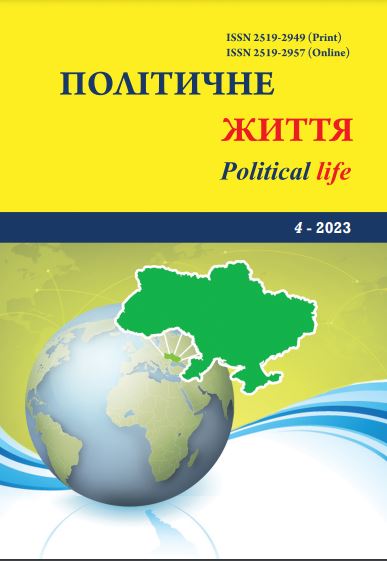The "Еternal peace" concept as a subject of world-system analysis and chinese viewpoint
DOI:
https://doi.org/10.31558/2519-2949.2023.4.20Keywords:
Kant; peace; world-system; world order; empire; hegemon; political process; political system; culture; civilizationAbstract
The article start from the well-known I. Kant`s treatise about "eternal peace". Such close attention to this issue is quite understandable. The Russian-Ukrainian war that flared up in the center of Europe finally destroyed the hope of mankind for the possibility of a lasting peace maintaining. The authors critically analyze Kant’s argument about the "natural" world history advancement towards "eternal peace" and draw attention to the fact that in different eras there were various attempts to establish peace in fairly large geopolitical spaces. This happened by establishing certain world orders. World orders could be established in the form of empires, or other systemic associations, but with the obligatory presence of an intrasystemic core, a political hegemon.
In this regard, the historical experience of world orders is analyzed, starting from Alexander the Great and ending with current events. In this context, the Chinese doctrine of the "world community of a common destiny" is considered. The article suggests that the most appropriate basis for sustainable peace is:
– the political hegemony of a state that is capable of bearing full responsibility for the it controlled territories and peoples and is ready to use its influence rightly and effectively in order to prevent wars;
– the presence of appropriate political, legal and cultural content that can motivate ethnic groups for interaction and mutual understanding (like in particular, an ancient Roman general imperial law, citizenship and a single language for all ethnic groups inhabiting the empire);
– the complete inadmissibility of the world dividing into "civilized" and "the rest." In the battle for world hegemony, the leader who can realize this and build his dominance on a multicivilizational and multicultural basis, can win;
– the transition from one world-system to another, which is taking place before our eyes, can be defined as a transition from one type of inclusiveness (based on the principle of “vertical projection” of the hegemon`s rules and values to the rest part of the world) to another type of inclusiveness (based on on the “patronage” principle, without diktat while ensuring equal “horizontal” cooperation of all the political process subjects without exception). This type of inclusiveness and this world order can become the basis of the very peace that Kant once spoke about.
References
Brzezinski Zbigniew. The grand chessboard: American primacy and its geostrategic imperatives, New York: Basic books, 1998. – 240 p.
Brzezinski Zbigniew. Strategic Vision: America and the Crisis of Global Power, Grover Gardner. Basic Books, 2012 – 224 p.
D’Amato Paul. A SYSTEM OF ORGANIZED VIOLENCE. https://socialistworker.org/2012/01/27/a-system-of-organized-violence
Encyclopedia of Modern Ukraine, v. 23. NOOSFERA. https://esu.com.ua/article-74036
Evolyuciya doktrinnih zasad zarubizhnoyi politiki SRSR, http://kimo.univ.kiev.ua/MVZP/10.htm/.
Fukuyama, Francis. The End of History and the Last Man, Penguin, 2012, 448 p.
Guyer Paul. Introduction to Kant’s essay in Political Philosophy y: The Essential Texts, Oxford University Press, 2005 available at http://www2.hawaii.edu/~freeman/courses/phil320/21.%20Perpetual%20Peace.pdf /
Huntington Samuel P. The clash of civilizations and the remaking of world order, SIMON & SCHUSTER Rockefeller Center, 1993 410 p.
Jones Howard. Crucible of Power: A History of U.S. Foreign Relations Since 1897, Rowman & Littlefield, 2008, 621 p/
Lenin V. (2022). Imperialism, the Highest Stage of Capitalism. Source: Lenin’s Selected Works, Progress Publishers, 1963, Volume 1, TranscriptionMarkup: Tim Delaney & Kevin Goins (2008) Proofed: and corrected Alvaro Miranda (2022) https://www.marxists.org/archive/lenin/works/1916/imp-hsc/imperialism.pdf
Ober Razum. Video recording of I. Stalin’s speech at the 19th Congress of the CPSU https://www.youtube.com/watch?v=u6EfhXy6Hv0
Panafidin I. O. Filosofska ideya miru: stanovlennya ta evolyuciya, Aktualni problemi duhovnosti: zb. nauk. prac / Red.: Ya.V.Shramko, Vip. 12, Krivij Rig, 2011, p. 345–355.
Toffler, Alvin. The Third Wave: The Classic Study of Tomorrow / Random House Publishing Group, 1981 – 537 p
Understanding Xi’s quotes on building a community with a shared future for mankind. https://english.news.cn/20230323/6d411c2465664137a7ad8e45ac0de8da/c.htm/
Wallerstein (1995), After Liberalism, Publisher New Press, NY

